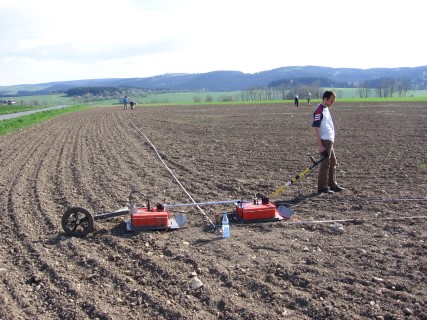ground penetrating radar

A ground penetrating radar sensor being pulled along the surface and measuring subsurface water content.
There are several similar techniques in this group and rely on a signal propagating from a transmitter through the soil to a receiver, or reflected back from the soil to the receiver. The wave detected by the receiver is related to the dielectric constant of the soil or substrate. Some approaches use two access tubes located at a specified distance with electronics in one access tube acting as the transmitter to the receiver electronics in the second access tube. The air launched surface reflection method does not directly contact with the soil. A vehicle, drone or satellite measures an air/soil reflection co-efficient which is then related to water content.
Methods which directly propagate signals through soil tend to have greater information about the soil profile than remote based measurements. Direct measurements can be installed to many meters whereas remote methods, measured via drones or satellites, only measure soil water content in the near surface (approximately 10cm depth). The advantage of remote methods is the ability to measure large spatial scales from tens of meters to entire countries and continents.
soil moisture instrumentation
related techniques
- Capacitance or frequency domain
- Time domain reflectometry (TDR)
- Time domain transmissometry (TDT)
- Cosmic-ray (COSMOS)
